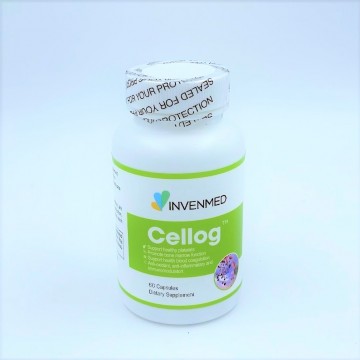Cellog
Availability: 131
CELLOG™
60 Capsules/bottle
Blood
and immune health
Cellog
is uniquely formulated herb medicine for supporting health functions of
platelets and bone marrow. It has antioxidant, anti-inflammatory and immune
modulation capabilities.
FUNCTIONS
Caffeic
acid is a phytochemical found naturally in green tea extract, ginger extract,
olive leaf extract and curcumin. It is also found in a variety of vegetables
fruits including, cayenne pepper, celery, thyme, tarragon, black tea,
cucumbers, apples, potatoes, radishes, cabbage, grapefruit, bell peppers and of
course coffee. Studies show that caffeic acid and its phenethyl ester (CAPE)
have multiple positive health and anti-aging impacts. It has anti-oxidant,
anti-inflammatory and anti-bacterial capabilities [1]. It inhibits the growth
of tumor cells by inhibition of nuclear factor kappa beta (NF-kappaB) [2] and
anti-metastatic by dually inhibiting MMP-2 and -9 enzyme activities and gene
transcription [3, 4].
Agrimonia is a herb traditionally used in Chinese medicine for a wide variety of health supporting purpose. Agrimony leaves are rich in vitamin K and are traditionally used to promote blood clotting and control bleeding. The stems and the leaves of Agrimonia pilosa have shown diverse pharmacological properties such as anti-tumor, analgesic, antibacterial, anti-inflammatory [5], hypoglycemic and vasoconstrictor activities. The plant is used in the treatment of abdominal pain, sore throat, headaches, bloody and mucoid dysentery and heat stroke. Recently, it is found to inhibit AChE (Acetylcholinesterase), an attractive target for treatment of the Alzheimer-type dementia [6]. Agrimoniin, a tannin contained in Agrimonia pilosa LEDEB, is found to be a potent antitumor tannin. Its effects may be due to this tannin enhancing the immune response of the host animals through the actions on tumor cells and some immunocytes [7, 8].
SUGGESTED
USE
Adults take
1- 2 capsules, twice daily with meals or as directed by a healthcare
professional.
INGREDIENTS
Caffeic
Acid, Agromonia Pilosa, Semen Coicis, L -Lysine, Sarcandra glabra, Lobelia
radians Thumb
SIDE EFFECTS
No adverse
side effects reported.
STORAGE
Store in a cool, dry place, away from direct light. Keep out of reach of children.
REFERENCES
1. Cho, H., et al., Novel caffeic acid derivatives: extremely potent inhibitors of 12- lipoxygenase. Journal of medicinal chemistry, 1991. 34(4): p. 1503-1505.
2. Watabe, M., et al., Caffeic acid phenethyl ester induces apoptosis by inhibition of NFκB and activation of Fas in human breast cancer MCF-7 cells. Journal of Biological Chemistry, 2004. 279(7): p. 6017-6026.
3. Chung, T.-W., et al., Novel and therapeutic effect of caffeic acid and caffeic acid phenyl ester on hepatocarcinoma cells: complete regression of hepatoma growth and metastasis by dual mechanism. The FASEB journal, 2004. 18(14): p. 1670-1681.
4. Jin, U.-H., et al., Caffeic acid phenyl ester in propolis is a strong inhibitor of matrix metalloproteinase-9 and invasion inhibitor: isolation and identification. Clinica chimica acta, 2005. 362(1): p. 57-64.
5. Sala, A., et al., Assessment of the anti-inflammatory activity and free radical scavenger activity of tiliroside. European Journal of Pharmacology, 2003. 461(1): p. 53-61.
6. Jung, M. and M. Park, Acetylcholinesterase inhibition by flavonoids from Agrimonia pilosa. Molecules, 2007. 12(9): p. 2130-2139.
7. MIYAMOTO, K., N. KISHI, and R. KOSHIURA, Antitumor effect of agrimoniin, a tannin of Agrimonia pilosa ledeb., on transplantable rodent tumors. The Japanese Journal of Pharmacology, 1987. 43(2): p. 187-195.
8. Murayama, T., et al., Agrimoniin, an antitumor tannin of Agrimonia pilosa Ledeb., induces interleukin-1. Anticancer research, 1991. 12(5): p. 1471-1474.Cellog
Pure Power Health Inc. © 2025


